Bunraku Blu-ray Movie
HomeBunraku Blu-ray Movie 
Arc Entertainment | 2010 | 124 min | Rated R | Nov 01, 2011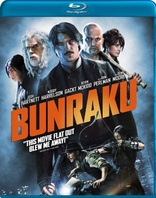
Movie rating
6.1 | / 10 |
Blu-ray rating
| Users | 1.0 | |
| Reviewer | 3.0 | |
| Overall | 3.0 |
Overview
Bunraku (2010)
A mysterious drifter and a young Japanese warrior arrive in a town controlled by criminals, each with a separate purpose. They meet at the Horseless Horseman Saloon, where the enigmatic bartender encourages them to join forces to bring down the evil Nicola the Woodcutter, who rules the city as head of a gang of killers.
Starring: Josh Hartnett, Gackt, Woody Harrelson, Kevin McKidd, Ron PerlmanNarrator: Mike Patton
Director: Guy Moshe
| Action | Uncertain |
| Martial arts | Uncertain |
| Thriller | Uncertain |
| Fantasy | Uncertain |
| Adventure | Uncertain |
| Drama | Uncertain |
Specifications
Video
Video codec: MPEG-4 AVC
Video resolution: 1080p
Aspect ratio: 2.35:1
Original aspect ratio: 2.39:1
Audio
English: DTS-HD Master Audio 5.1
Subtitles
English SDH
Discs
25GB Blu-ray Disc
Single disc (1 BD)
Playback
Region A, B (C untested)
Review
Rating summary
| Movie | 2.5 | |
| Video | 4.5 | |
| Audio | 4.5 | |
| Extras | 2.5 | |
| Overall | 3.0 |
Bunraku Blu-ray Movie Review
A Homage to Everything Except Story
Reviewed by Michael Reuben October 31, 2011Directors in love with movies aren't an unusual phenomenon, and their work can be brilliant and inspired. Tarantino, Bertolucci, Scorsese and Woo are just a few examples of innovative talents who have drawn creative fire from cinematic giants who preceded them. But a cinema of homage risks becoming disconnected and incoherent unless it remembers to do the essential work of telling a story and entertaining an audience. The talents who invented cinema as we know it -- directors like Griffiths, Ford or Hitchcock, just to name a few -- didn't try to imitate anyone; they were too busy doing their job as storytellers. They never set out to create an Art Form, and they certainly never let the worship of what they were doing get in the way of actually doing it. Writer-director Guy Moshe is a prodigiously talented filmmaker, who, working from a story by producer Boaz Davidson (most recently, the remake of Conan the Barbarian), has fashioned Bunraku, a two-hour collage of references to other films, tricked out with so many stylistic flourishes that you can almost overlook the slimness of its plot. Almost. One of Moshe's favorite films is Sergio Leone's Once Upon a Time in the West, which, as Moshe observes, is a compendium of elements from dozens of previous Westerns. Moshe figured, why stop at one genre? For Bunraku he frappéed samurai films, spaghetti westerns, gangster films, Hong Kong martial arts, graphic novels, anime, pulp exploitation films -- and let's not forget musicals. The result is frequently ravishing to behold, because Moshe attracted impressive collaborators, including Alex McDowell, one of Hollywood's top production designers, who served as producer, and editor Zach Staenberg, who won an Oscar for his work on The Matrix.
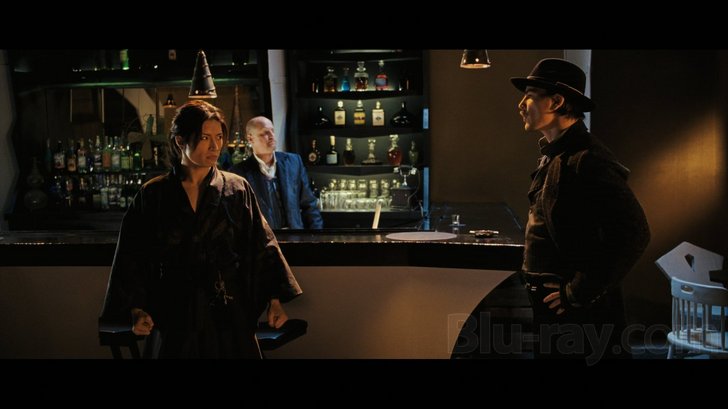
"Bunraku" is a traditional form of Japanese puppet theater, and Moshe's film is as stylized and artificial as anything you'd see on a stage. It's a variation on the classic tale of a stranger coming into a lawless town seeking revenge, only Moshe offers two strangers: one known only as the Drifter (Josh Hartnett) and Yoshi (Japanese star Gackt). The Drifter's mission isn't spelled out until the end, although it isn't hard to guess. Yoshi has arrived to reclaim a dragon medallion that is rightfully his father's. Yoshi's uncle (Shun Sagata), who owns a Japanese restaurant that pays protection money to local criminals, is none too happy to see Yoshi, because he knows that his nephew's arrival spells trouble. Of course, Yoshi's young cousin, Momoko (Emily Kaiho), feels differently, because . . . well, you've seen Shane, haven't you? The town to which Yoshi and the Drifter have journeyed is as much a collage as the movie. It has no name, although Moshe calls it "Bunraku-ville" in the commentary. It has elements of contemporary technology (trains, cars, telephones) and a layout resembling a modern city, but the mood is that of a Wild West town, complete with a saloon named The Horseless Horseman owned by the Bartender (Woody Harrelson). No one carries a gun, because, as we're told in a prologue narrated by a helpful narrator (former Faith No More lead singer Mike Patton), gun violence had so escalated that guns were banned throughout society. No explanation is provided for how a government so powerful that it could collect and destroy all firearms suddenly vanished, leaving "Bunraku-ville" at the mercy of Nicola the Woodcutter (Ron Perlman) and his Gang of Nine killers, but for as long as anyone can remember Nicola has ruled the town with an iron fist. The red-suited minions of the Gang of Nine are free to do as they like, as long as they don't cross the Gang of Nine, all of whom are expert killers. The most expert, other than Nicola, is Killer No. 2 (Kevin McKidd, from Journeyman and Rome), who dispatches his opponents with the precision and grace of a dancer. Of course, it's inevitable that Yoshi and the Drifter will initially clash and ultimately join forces to take down Nicola, and that they'll receive essential aid and counsel from the Bartender, whose limping gait wasn't acquired by happenstance. The Bartender's shadowy past seems to be tied somehow to a tough-looking woman named Alexandra (Demi Moore), whom everyone refers to as "Nicola's whore", but she's much more than that. By now, anyone who's dialed into Moshe's world of references might be thinking of another movie (Indecent Proposal) in which Demi Moore and Woody Harrelson played a happily married couple split up by a bargain with a powerful man. But one of the inherent problems with building a film out of references to other films is that the medium, by its nature, doesn't allow one to pause and reflect on such associations, as a reader of poetry might do. This is especially a problem, given Moshe's hyperkinetic style in Bunraku. Part action spectacle, part video game, the film keeps bustling around for the sheer sake of bustling, and essential plot points are often tossed off quickly, as a kind of nuisance that has to be gotten out of the way before we can get on with the real business at hand. Blink at the wrong moment, and you may miss the motivation for the next twenty minutes' activity. Not that the activity isn't artful and accomplished, because it is, extremely so. Moshe shot the entire film on soundstages in Romania, where nearly every set was designed to be enhanced and extended by CGI. (Some sets were almost entirely green screen.) Almost all the exterior images of "Bunraku-ville" were computer-generated, as were numerous small touches, including the English subtitles that appear as graphic novel text. If Bunraku is the kind of film that captures your imagination, then it will have high re-watch potential, because frame after frame has been stuffed with lovingly conceived detail. But if you're like me, you'll have to work at it to make it through a single viewing, despite the charms of a talented cast, especially Kevin McKidd's suavely vicious Killer No. 2. Moshe's idol, Sergio Leone, took huge chances by freighting a story with so much operatic emotion that he risked rupturing the narrative fabric and losing the audience. (I know viewers who think Leone went too far in his later films.) Moshe seems to have decided that narrative is a mere formality, a minor inconvenience, and I don't think a filmmaker can afford such an attitude, even for a film that (as Moshe says in the commentary) isn't meant to be taken seriously. Just because the subject isn't serious doesn't mean you get to toss basic craftsmanship out the window. That's a little like saying: "We're not showing serious films at this theater, so don't bother pouring a foundation."
Bunraku Blu-ray Movie, Video Quality 
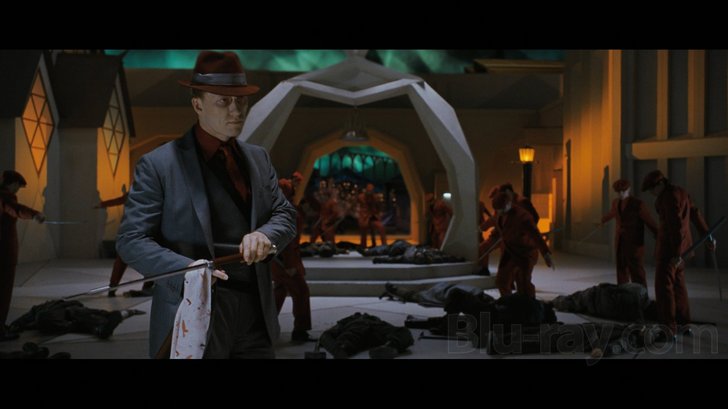
Bunraku was shot by Juan Ruiz Anchía, who has done impressive cinematography for David Mamet and James Foley, among others. But Bunraku is not a film where the cinematographer has nearly as much impact on the movie's appearance as the technicians in the various digital suites. Indeed, although Bunraku was shot on film, it looks more like a hi-def production, since so much was created in the digital realm, and artificiality seems to have been the watchword. The Blu-ray's 1080p, AVC-encoded image is consistently smooth, glossy and grainless, with textures that are often clearly intended to resemble a video game world more than a realistic environment. Because nothing is realistic, detail can be hard to judge, but the sheer volume of minutia in many of the frames suggests that detail is well-resolved. Black levels are solid, and the vivid neon fluorescence of "Bunraku-ville" gives the image the HD "pop" that is so beloved by many enthusiasts. (In pre-release publicity, the film's look was compared to that of Sin City, but the colors are considerably more varied and the frame is much busier.) Having been sourced from a digital intermediate, the image is free of post-transfer digital scrubbing or edge haloes, and the lack of grain simplified the compressionist's job, preventing artifacts.
Bunraku Blu-ray Movie, Audio Quality 
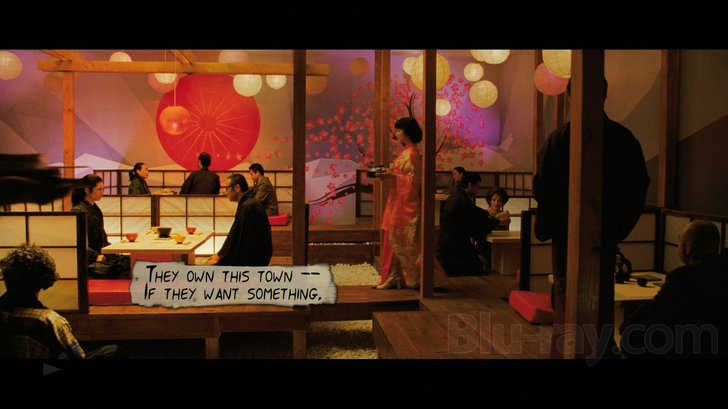
The DTS-HD MA 5.1 track is extremely active and aggressive, taking full advantage of the rear channels to place sounds to the rear of the listening environment. Guns may have been banned from "Bunraku-ville", but that leaves plenty of room for crashes, falling objects, entrances and exits, vehicles and other assorted sonic events off-camera. Although dialogue is not a major component of the film, what talk there is can be clearly heard at the front center. The single finest component of the track, however, is the playful score by jazz musician Terence Blanchard, who's certainly in on the joke and strikes just the right note of mocking playfulness for Bunraku's gonzo style.
Bunraku Blu-ray Movie, Special Features and Extras 
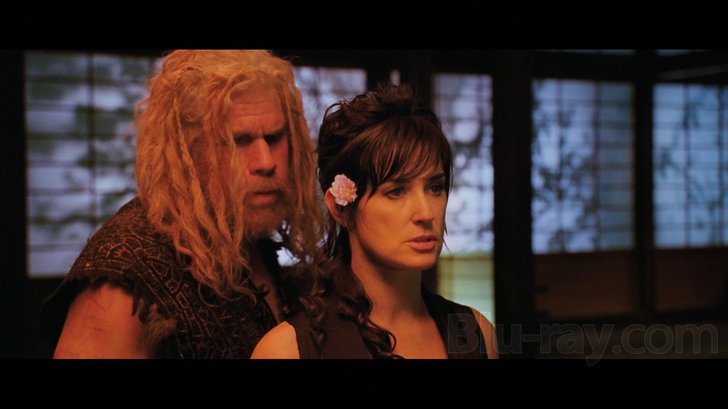
- Commentary by Director Guy Moshe and Actor Kevin McKidd: Moshe does most of the talking, since McKidd's knowledge is limited to scenes featuring his character, "Killer No. 2". Moshe discusses his influences and intentions at length and has nothing but praise for the cast and other collaborators. He also delights in pointing out elements in the visual fabric that are real and not CGI and in noting stunts that the actors performed themselves. Moshe's enthusiasm is palpable, and one can certainly understand his ability to inspire a soundstage full of actors, stuntmen, electricians, grips and assorted crew members.
- Theatrical Trailer (HD; 2.35:1; 2:27): It actually tells the entire story of the film (which is not the same thing as the experience of the film).
- Additional Trailers (HD): At startup the disc plays trailers for Ironclad, Killing Bono and John Carpenter's The Ward. These can be skipped with the chapter forward button but are not otherwise available once the disc loads.
Bunraku Blu-ray Movie, Overall Score and Recommendation 
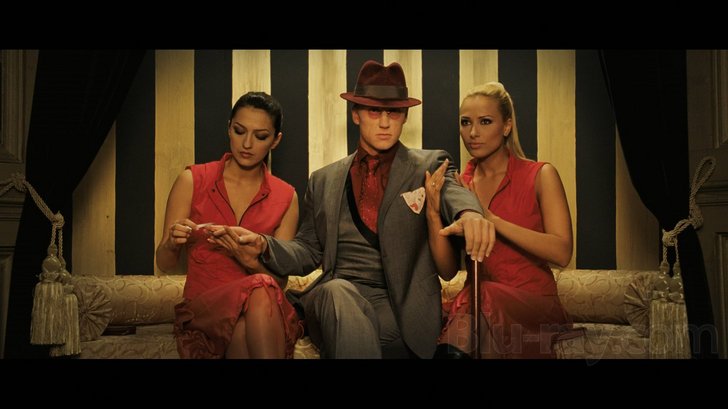
Moshe is an interesting director, and Bunraku is overflowing with intriguing visuals. It has "cult classic" written all over it. If you happen to vibrate at its particular frequency, then this is a disc you'll want to add to your collection. I'm more interested in what Moshe does in the future, if he can bring these kind of pyrotechnics to bear on a story that's more than an outline, peopled by characters who are more than attitude with a name (and, in most cases, not even that). If you're the kind of viewer who expects strongly defined characters and coherent storytelling (e.g., me), then Bunraku isn't for you. On its technical merits, though, the Blu-ray is recommended.
Similar titles
Similar titles you might also like

Sucker Punch
Extended and Theatrical Cut
2011

In the Blood
2014

Ninja Assassin
2009

John Wick: Chapter 3 - Parabellum
2019

War
Rogue Assassin
2007

DOA: Dead or Alive
2006

The Warrior's Way
2010

House of Flying Daggers
Shi Mian Mai Fu
2004

The Great Wall 4K
2016

Outcast
2014

G.I. Joe: The Rise of Cobra 4K
2009

47 Ronin 4K
2013

Pathfinder
Unrated
2007

Rambo: Last Blood 4K
2019

American Assassin
2017

Colombiana
2011

The Mechanic
2011

Tomb Raider
2018

Robin Hood
2018

The Man with the Iron Fists
2012